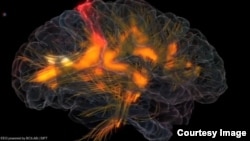For the first time, researchers have shown that talk therapy improves symptoms in people with mental disorders. They say it strengthens connections in the brain, with long-lasting improvements.
Talk therapy has tended to get short shrift in the treatment of people who have been diagnosed with mental illness. Usually, medications are the first treatment doctors reach for to lessen symptoms of psychiatric disorders.
This is especially true in the case of people who suffer from psychosis marked by abnormal thoughts. Psychosis is common in schizophrenia and some severe forms of depression.
But researchers at King's College London have shown that a combination of medications along a kind of talk therapy, known as cognitive behavior therapy or CBT, not only improves symptoms in people who suffer from false beliefs, but the changes can last a long time.
Liam Mason is a clinical psychologist at King’s College who led the study published in the journal Translational Psychiatry.
Using brain imaging, Mason and colleagues saw connections between two brain regions strengthen in patients following a six month course of CBT. The improvements occurred between the amygdala, the part of the brain that controls fear and emotion, and the frontal lobes, which are involved in thinking and reasoning.
“And what we are really excited about here is that these stronger connections appear to be linked to long term improvement in people’s symptoms and recovery, even as much as eight years later,” said Mason.
In the original study, a group of participants suffering from psychotic symptoms took medication. Some also received cognitive therapy, while the others did not.
Researchers saw an improvement in brain connectivity in those who had talk therapy that was not seen in the non-CBT group.
Investigators then followed 15 of the 22 CBT patients for eight years, using medical records and questionnaires. They found the participants’ level of recovery and well-being was still improved, without additional therapy.
Mason says the finding shows an association between talk therapy and long-term recovery in patients who had been haunted by paranoid beliefs.
“Traditionally, the only interventions or treatments that have been offered are medication and even surgery in the past as well,” said Mason. "So I think, and the whole research team are really excited about, these findings that show that actually it's possible to have these brain changes from psychological therapies as well.”
Investigators will now try to confirm their findings in a larger study of patients with mental illness.
Researchers hope the results could lead to more refined and improved treatments for people who suffer from psychiatric illness.




